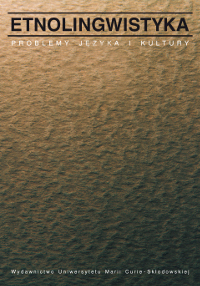Polskie słowa-wartości w perspektywie porównawczej. Część I. Dobroć
Polish “value words” in comparative perspective: dobroć
Author(s): Anna WierzbickaSubject(s): Anthropology, Language studies, Language and Literature Studies, Applied Linguistics, Cognitive linguistics
Published by: Wydawnictwo Naukowe Uniwersytetu Marii Curie-Sklodowskiej
Keywords: Polish values-words; dobroć ‘goodness’; word’s semantics; comparative perspective; Polish; English; French; Russian; hierarchy of values
Summary/Abstract: The article deals with the Polish word dobroć in comparative perspective. An assumption is made that an especially precious source of insight into the values of a given society are the key words used in that society. One of such words in Polish society is dobroć. By analyzing the word’s semantics, the author shows the differences between that word and its closest equivalents in a few European languages: the English goodness, the French bonté or the Russian dobrotá. In the Polish hierarchy of values, dobroć ranks high as a positive human feature, manifested in people’s feelings, will and actions. The English goodness (derived from the adjective good) differs from the Polish dobroć in that it does not imply good feelings towards other people. The French bonté, in turn, although used in reference to people who want to do and actually do good things for others, it does not, in contrast to dobroć, imply emotional overtones. On the other hand, the Russian dobrotá differs from dobroć in that it is primarily used in reference to someone’s emotional attitude towards others (expressed in one’s facial appearance or the tone of voice) but not actions. The author hypothesizes that bonté does not contain the emotional component (present in dobroć), and that dobrotá does not contain the element of action (present in dobroć and bonté). Neither does dobrotá occupy the central position among Russian values: that place is reserved for žalost’, an axiological category without a Polish equivalent. Similarly, in contemporary Englishspeaking cultures greater importance is attached to kindness than to goodness. Having discussed the semantics of dobroć, the author inquires into the historical and cultural origin of the associated concept and attempts to explain its uniqueness. A hypothesis is put forward that in Polish culture the attitude of the heart and will, reflected in the concept of ‘goodness’, finds its prototype in the figure of the Virgin Mary.
Journal: Etnolingwistyka. Problemy Języka I Kultury
- Issue Year: 23/2011
- Issue No: 23
- Page Range: 45-66
- Page Count: 22
- Language: Polish

